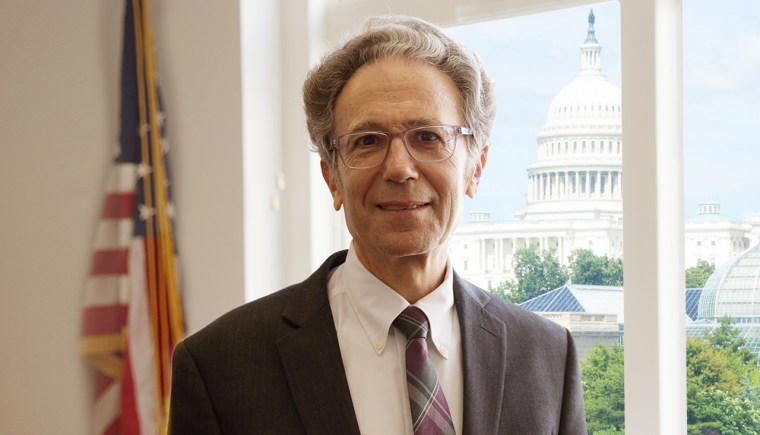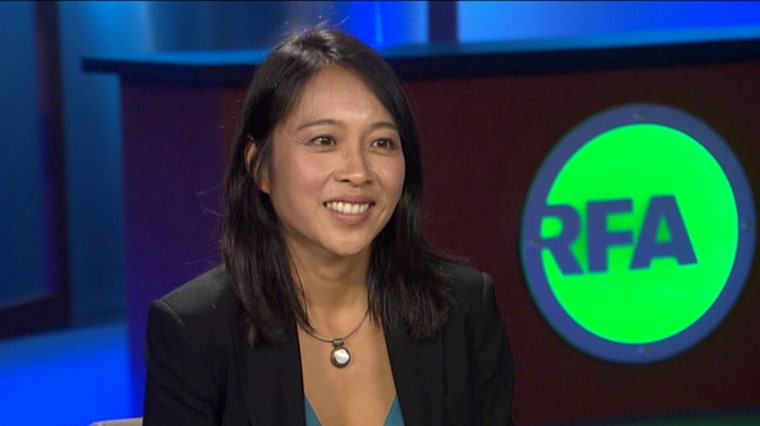WASHINGTON — The new chief of U.S.-funded global media has sacked the top editor at an outlet that serves a large audience in China and across Asia, the latest firing to raise fears the Trump administration could undermine the editorial independence of the news networks, three sources with knowledge of the matter said.
President Donald Trump's newly appointed CEO of the U.S. Agency for Global Media, Michael Pack, fired Bay Fang as executive editor of Radio Free Asia on Wednesday, the sources told NBC News.
In another move that has caused consternation among the editorial staff, Pack’s office has indicated that dozens of foreign journalists employed at the U.S.-funded broadcasters may not have their U.S. visas renewed. A spokesperson for the U.S. Agency for Global Media said it was conducting a “case-by-case assessment” of contractors who hold J-1 visas.
“To improve agency management and protect U.S. national security, it is imperative to determine that hiring authorities and personnel practices are not misused,” the spokesperson said in an email to NBC News.
The U.S.-funded news services rely heavily on foreign journalists to translate reports on events in the U.S. into dozens of foreign languages and to cultivate local sources in repressive societies.
Since he was confirmed as CEO in a party-line vote in June after a lobbying push from the White House, Pack has fired all the heads of the four news outlets under his agency as well as the members of the bipartisan boards that governed them. Pack replaced the boards mostly with political appointees of the Trump administration, and named himself as chairman. He also reassigned an editor for standards at Voice of America.
The sweeping shake-up — which critics say amounts to a purge of the organization — has fueled concerns among journalists at the outlets and lawmakers in Congress that the long-established editorial independence of the news networks is at risk.

Radio Free Asia and other U.S.-funded broadcasters, including Voice of America, have long operated behind a so-called firewall that is supposed to insulate the outlets from partisan political interference from government officials.
"The fear is the firewall won't be protected. First he removed all the heads of organizations. Now he's getting rid of an executive editor," said one of the sources familiar with the situation.
The U.S. Agency for Global Media did not respond to a request for comment.
Pack already had removed Fang as president of Radio Free Asia after he took over as CEO last month. Fang, an experienced journalist and former diplomat, then returned to her previous job as executive editor at Radio Free Asia, in accordance with the terms of her employment arranged by the former board that oversaw the network.
Several journalists working for the outlets told NBC News morale had plummeted since Pack took over and that the new CEO had yet to communicate any detailed plans for the media networks.
Before Pack's confirmation, President Trump and his political allies, including Steve Bannon, blasted VOA's coverage of China, accusing the broadcaster of adopting a deferential tone and relaying Beijing's propaganda. But journalists at VOA and press freedom groups say the criticism rings hollow. China has often sharply criticized VOA's reporting and even expelled its journalists.
During Fang's tenure at Radio Free Asia, the network played a leading role in exposing China's internment camps for Uighurs in Xinjiang, and also ran stories on Beijing's underreporting of the death toll from COVID-19 in Wuhan province.

Coinciding with the outbreak of the coronavirus in China, Radio Free Asia's Mandarin service Facebook page had a nearly 400 percent increase in engagement and 800 percent increase in video views in the first three months of this year in comparison with the last three months of 2019, according to Radio Free Asia data.
Apart from cleaning house at the news networks, Pack has also fired the bipartisan board and chief of the Open Technology Fund, an internet freedom organization. The fund provides open source tools and applications — like Signal and Tor — to people in dozens of countries trying to access information in repressive conditions.
The fund, a non-profit registered in Washington, D.C., has challenged Pack’s decision in federal court, arguing he does not have the legal authority to fire the governing board or the director. A federal judge denied a request for an emergency injunction but the court battle continues.
More than 480 internet freedom, human rights and press watchdog groups have signed a letter calling on Congress to safeguard the work of the fund.
Voice of America and the U.S.-funded broadcasters have enjoyed strong bipartisan support for decades, and Pack's actions have raised alarms on both sides of the aisle in Congress. Last week, a bipartisan group of seven senators — who oversee funding for the U.S. global media outlets — wrote a sharply-worded letter to Pack criticizing him for failing to consult with Congress and for the recent firings.
"The termination of qualified, expert staff and network heads for no specific reason as well as the removal of their boards raises questions about the preservation of these entities and their ability to implement their statutory missions now and in the future," said the letter from the senators.
The letter was signed by Sens. Marco Rubio, R-Fla., Lindsey Graham, R-S.C., Jerry Moran, R-Kan., Dick Durbin, D-Ill., Patrick Leahy, D-Vt., Chris Van Hollen, D-Md., and Susan Collins, R-Me.
Pack responded to the letter from the senators, promising a collaborative relationship with Congress and to uphold the “independence” of journalists at the U.S.-funded networks.
In his letter, provided by the U.S. Agency for Global Media’s press office, Pack said his goals are “making the agency more effective, including ramping up the impact of the broadcasting networks; ensuring that nothing interferes with the ability of the agency to report the news, and; improving agency morale.”
Pack has directed and produced documentaries since the 1980s, including most recently a sympathetic portrayal of Supreme Court Justice Clarence Thomas. Steve Bannon collaborated with Pack on some of his projects. President George W. Bush named him as the director of Worldnet — which later merged with the Voice of America. Pack also worked as a senior vice president for television programming at the Corporation for Public Broadcasting and was president of the Claremont Institute in California, a conservative think tank.
Pack defended his actions as CEO of the U.S. Agency for Global Media in an interview with the Washington Times newspaper.
"So on my first day here, I brought in a team of politicals and I had the career people report to them — not an extraordinary thing to do," Pack said. "And then I changed the leadership of all the networks. All. To have a fresh start. Democrats and Republicans. I naively thought that that would make sure that it wasn't perceived as a partisan witch-hunt. How could it be?"
He added, "Of course it was anyway."